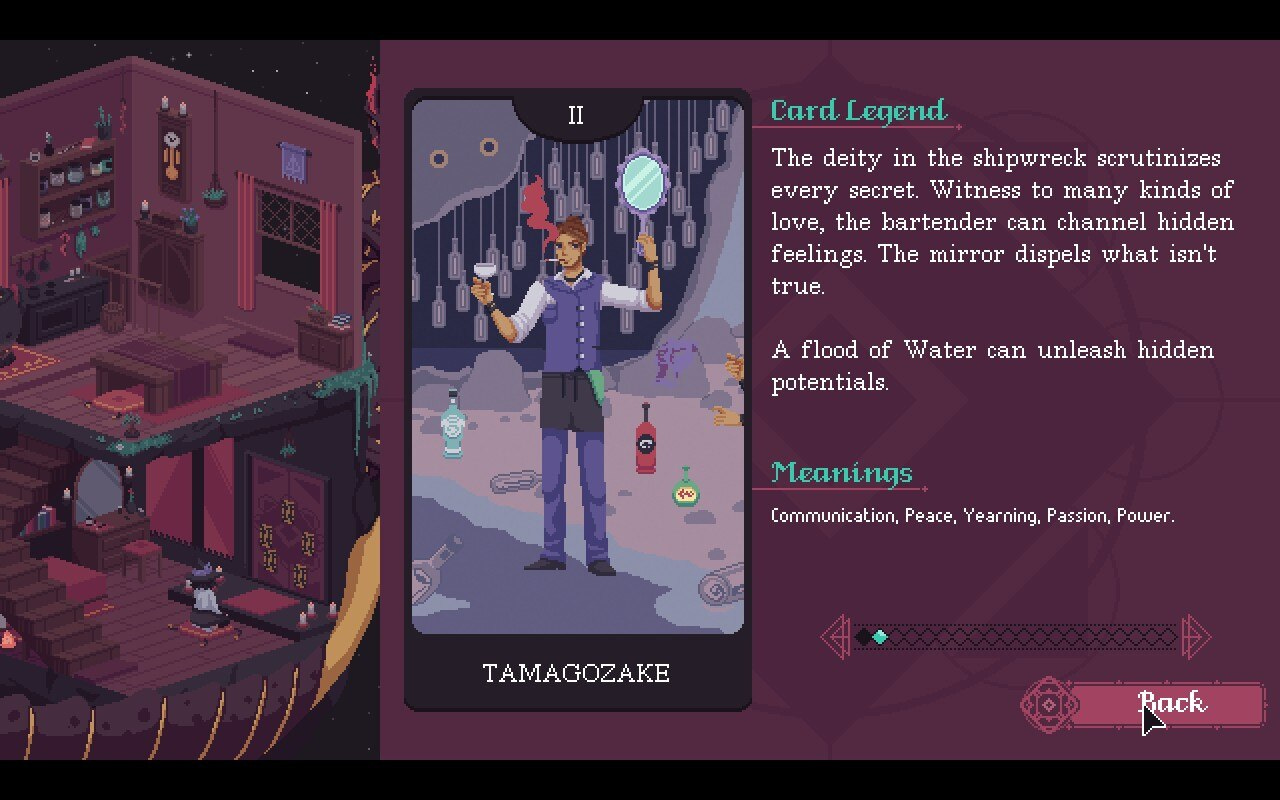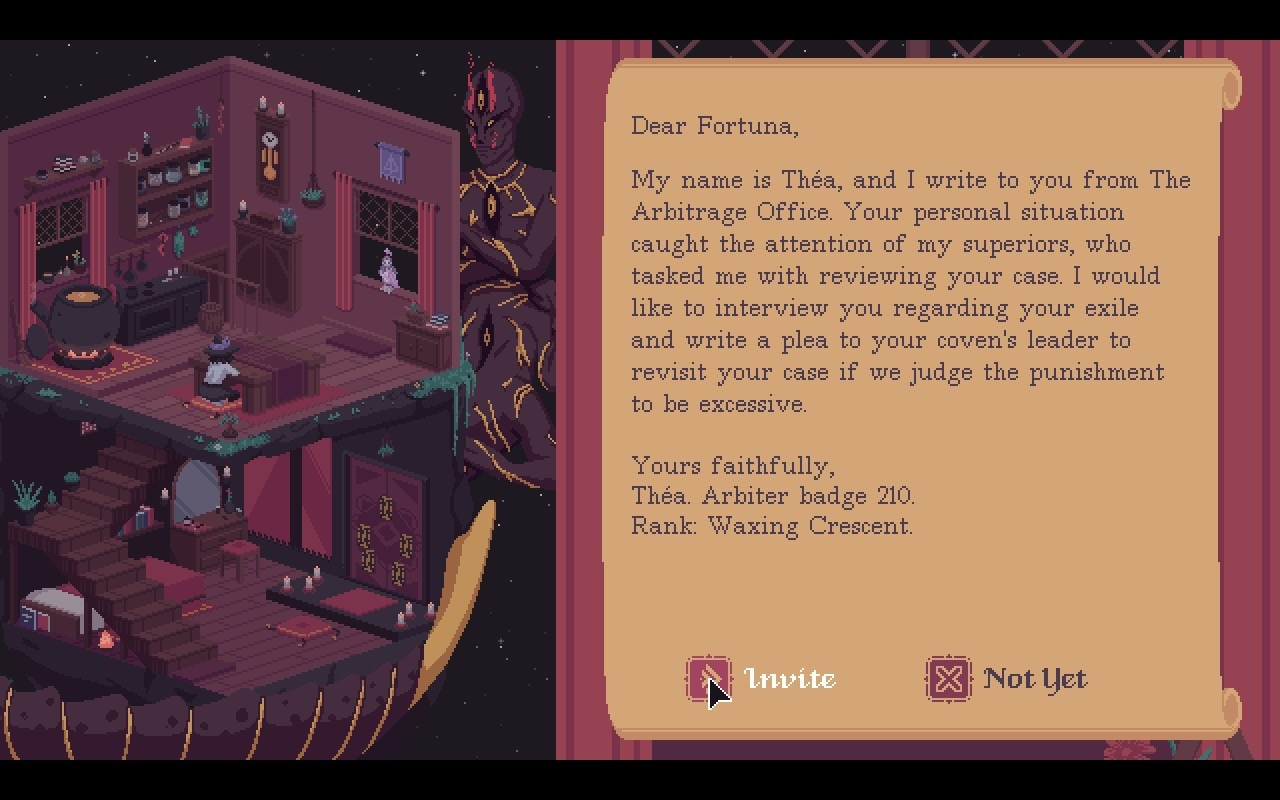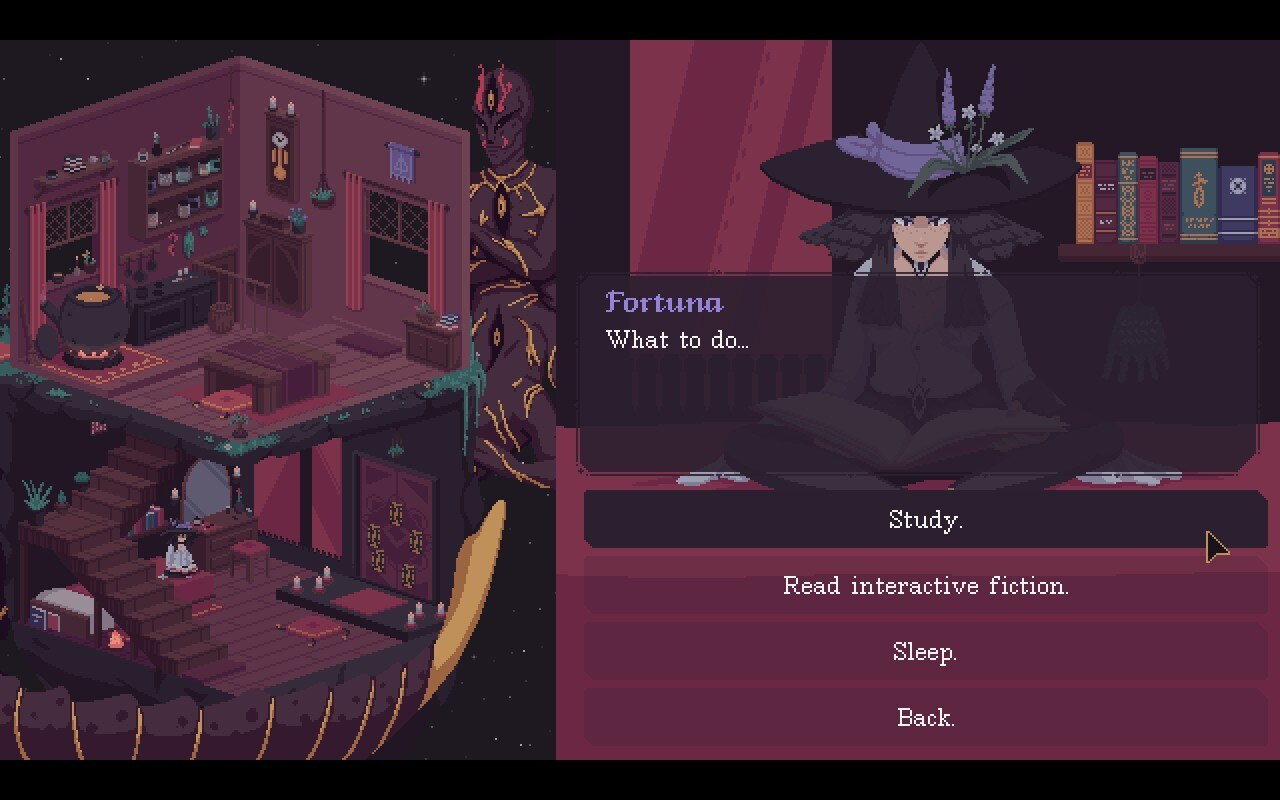Switch, PC, Steam Deck
$17.99
7 hours long
The Cosmic Wheel Sisterhood is a sci-fi adventure game where you play an exiled witch called Fortuna who, naturally, is a fortune-teller. You perform readings for visitors with a custom Tarot deck, and in doing so, influence and manipulate their future, with epic consequences.
As a visual novel, the story is the main attraction, conveyed largely through written dialogue. To begin with, the dialogue is solely with Abramar, a demon (aka “Behemoth”) Fortuna summons in desperation 200 years into her millennia-long exile for predicting the fall of her coven. Abramar agrees to teach her magic – for a price. As he explains how to craft a new Tarot deck out of air, water, earth, and fire, he asks you important questions: “Would you kill Aedana [the coven leader who exiled you] if you had a chance?” Would you want to be feared, adored, or pitied? Do you desire knowledge or power?
There are no right or wrong answers, but they do bind your future. Not long into the game, my first meeting with a visitor, an arbiter checking up on my exile, saw them adore me after I told her fortune, leading her to lift the ban on visitation. Obviously it would’ve been lifted regardless – I would’ve scared her or she would’ve felt sorry for me – but it was written in such a way that I felt a little scared of my own power.
Aside from talking to visitors and choosing dialogue options, the core of the game revolves around creating tarot cards and performing readings. Tarot cards are crafted by combining three types of magic images: a “sphere” for the card background, “arcana” representing the major figure, and “symbols” for “magical pizzazz”. Each image has an enigmatic backstory attached, along with a magic energy cost consisting of a mix of the four elements – for example, The Shipwreck Library sphere image costs two water, while The Penitent One arcana costs five fire, two earth, and one water. New images unlock as you meet people, and sometimes you’re gifted images directly, including “Super Arcana” (a silly name, IMO) which cost more magic and do special things that I could not discern.
Neither was I able to discern any particular art or challenge in choosing the three images for a card other than the mix of elements required, which is usually limited by whatever you have on hand; Abramar gives you some to begin with, but you earn more through readings (more on that later). I didn’t feel put out by this though; tarot reading and fortune telling is hardly meant to be a min-maxing science. That’s probably why I didn’t mind the process of arranging the elements of the three images onto a card, either. Cleverly, the game presents the images only partially completed (e.g. a bartender figure has no arms until you add them manually), encouraging even the most hard-hearted players to personalise their cards. Does it change the gameplay? I have no idea, which, unusually, is fine!
Once all the images are positioned, the card is created, complete with a unique, procedurally-generated description. The madlibs-style phrasing is inevitably stilted, but again, works well with popular understandings of tarot conventions. You can create up to 20 cards, but I only made around ten, and you could probably play the entire game with even fewer; in other words, you’ll make a bunch of cards but you’ll spend most of your time doing other things – like tarot readings.
Readings usually happen in one-on-one meetings with visitors. They’ll ask you one or more questions like “why is my garden poorly?” or “how will I die?”, then you’ll draw one card at a time from your deck and assign it to a question. Once assigned, you choose between at least two different readings; for a reading of Abramar’s past, I could pick between “your first love was a Witch named Gloria” or “your life experiences lead you to despise most Witches. But you love some of them.”
There seem to be up to eight possible options for every reading, and the ones you can view and choose from are determined by the component elements of the assigned card and their resulting meaning. This means you can try and influence readings by steering a card with a destructive meaning toward a question that you want a more negative vibe for, but the meanings are multiple and it’s never straightforward.
After each reading, you harvest energy based on the vibes of the option you chose (water is emotion, etc.). I found myself choosing options that would replenish energy in the elements I was running low in, though there wasn’t any pressing reason to do this other than not wanting an imbalanced deck; if I ran out of fire, then I wouldn’t be able to make any more cards with fire-based images. Then again, it never really felt like there was much point in having that many cards since they got drawn randomly, anyway. It was more useful having energy to spare as sometimes visitors would need it as payment for favours.
Despite my longwinded explanation, fortune telling in The Cosmic Wheel Sisterhood is ultimately a pretty simple piece of gameplay. The reason I’ve gone into so much detail is because I’m so impressed with how well it works. It’s the perfect balance of imagination and mystery and randomness and choice. Any more random and players would throw up their hands in exasperation; any more choice and they’d min-max it to death. If someone asked me to design a tarot reading mechanic to fit into a story-driven game, I might have said it was impossible – but this game proves me wrong.
At first, you’re doing readings for everyone who visits, all of whom are witches. Visits are preceded by a letter borne by witches’ animal familiars, meaning you can choose to invite them to your home in exile in any order. Once invited, they appear immediately and you have a bit of dialogue to get to know them before the proper business of fortune telling begins.
In The Cosmic Wheel Sisterhood, fortunes aren’t only used in a direct sense of “what’s going to happen in my future?” but as a way to ask broader questions to help understand their past or process grief. As you answer some intensely personal questions, you quickly realise how powerful and dangerous your gift is; people really do believe what you tell them, or at the very least, they’re shaken by the answers, which can be specific enough to accuse particular people of wrongdoing. You can manipulate people – it’s intoxicating.
For most of the game, your routine is to receive a few letters, meet visitors in whichever order you like, then have a chat with Abramar to reflect on what was learned and move the story along. As you meet people and collect energy and images, you’ll craft more cards.
You can take a break between visitors or fill time while waiting for letters in three ways: studying, reading interactive fiction, and sleeping. Studying gives you short excerpts from books about magic. Interactive fiction sees you read stories that feature a few multiple choice questions that change the story. Some of the stories are bizarre and they don’t really work due to the limitations of the game’s user interface; one sees two characters having a long conversation which I found impossible to parse. Sleeping comes with dreams based on cards you’ve created, with a nice little short story. Sometimes you’ll get extra energy for these activities.
The Cosmic Wheel Sisterhood masks its visual novel origins in a few ways. Your home in exile is rendered in isometric pixel art, and you can click to walk to locations for making cards, reading letters, resting, and elections. The walking is very slow and clearly only present to make the game look more “interactive”. I don’t begrudge the designers for this – many players place enormous value on the feeling of interactivity even when it serves zero gameplay function. That’s humans for you!
I appreciated other artistic touches, though: the stylish intro video reminded me of Steven Universe in a good way, and the animated interludes were cinematic and well-directed.
The writing was also great, right from the start – concise, lyrical, mysterious. My only knock is that Abramar, your Behemoth companion, spoke half like Data from Star Trek, avoiding contractions, and half more casual. I am pretty sure this was intentional, and it might have worked well with vocals, but not so much in text.
The game also gets into trouble when it pushes beyond what its dialogue-focused user interface can handle. The text box can only show up to four lines; this is fine for a normal conversation, but when visitors try to convey complex ideas and get you to make interlocking multiple choices, it becomes a headache to navigate. A different interface, capable of displaying text and other information in a more structured way, would’ve been more appropriate.
These are minor issues compared to The Cosmic Wheel Sisterhood’s excellent story. From the screenshots, I assumed it would be a classic “cosy” game with little conflict or drama, set in a typical fantasy world. Instead, it’s a high concept sci-fi epic where you hear tales of wars fought in neutron stars, heretics exiled to asteroids, AIs taking over Earth, and witches who feel more like demigod scientists.
Earlier, I mentioned how you can influence the fortunes you tell. It soon becomes clear that those fortunes are always true and accurate. The only way this can possibly make sense is if your fortune telling changes reality – not just the future but also the past. You aren’t reading fortunes, you’re writing fortunes. This is treated with the gravity and amazement it deserves, and it’s also fascinating from a gameplay perspective. We’re used to making important choices in games, but they tend to be things our character has direct control over – you might choose to say one thing or another thing, or travel to one or another place. But the fortunes you write here aren’t about yourself; sometimes they’re not even about other characters, they’re about the universe. You can change the way people met, or conjure a new planet into existence. It’s more like creative writing than choose your own adventure.
Like the best sci-fi, it pushes its concepts to the very limit, yet it doesn’t fall into the trap of treating its characters like robots. This is aided by the story being rooted in more or less the present day, since we see how Fortuna ascended to become a witch from being a normal human on Earth. I was reminded of The Magicians and Three Thousand Years of Longing by its sophisticated, epoch-spanning worldbuilding and tragic human-level relationships.
Everything feels incredibly specific rather than wallowing in tropes, from its ideas about immortality and legacy to its eponymous sisterhood. Everyone in the game is a woman; some of them are friends and lovers and colleagues, some of them are very horrible to each other, and frequently these areas overlap. I loved it.
There’s just one moment where the story gets unstuck, when it ventures into politics. Perhaps as a result of the game being made over the last five years, there are a few clunky references with 2020-era politics that will age poorly. This is a shame given that the game fares much better on less current themes, like passing references to the Spanish civil war and inflation.
Politics also bedevils the latter part of the game, where The Cosmic Wheel Sisterhood transforms into an election simulator with a predestination twist. Over the course of 32 cycles (days, essentially), you can send your allies and Abramar off to influence the hundred witches of your coven to vote for you as their next leader. Each action taken by your allies takes 3-5 cycles (e.g. digging up dirt, promoting your platform, finding more allies), so you’d think you might need to be strategic about what to spend your time on, but in the end I exhausted all possible actions with ten cycles to spare.
Similarly, the simulation is sophisticated enough to include charts of voting intentions broken down by demographics, but it doesn’t quite make sense – an ally will return and say “X is going after the witch novices,” and you’ll see them improve their polls; then a few seconds later they’ll continue, “I went after the witch novices like you asked me to,” and your numbers will improve.
I understand why it’s like this from a mechanical perspective, but it’s another case of the game engine being asked to do things it’s not designed for. Perhaps the entire election is a commentary on uncertainty, but it’s unfortunate that the most game-like bit of The Cosmic Wheel Sisterhood works worst overall. Again – it’s a minor criticism and the game recovers handily with a satisfying ending.
I recently watched every Park Chan-Wook movie as part of the Blank Check podcast’s series on his work. Park has skipped between horror, crime, romance, and historical thrillers over the past few decades, but whatever genre he’s working in, he always gets into every scene late and leaves early, which is to say that he doesn’t belabour explanations and he keeps the action moving fast – so fast that you’re sometimes left a bit confused what’s going on.
The best compliment I can give The Cosmic Wheel Sisterhood is that it reminded me of a Park Chan-Wook movie. It’s incredibly specific, it has absolute confidence in its material, and every time you think you’ve figured out how the gameplay and story works, it’ll change – but not so much that it it becomes gimmicky. There isn’t anything quite like this.














I bought the game on a whim a couple of weeks ago and now want to play it with my wife who collects tarot decks.
You've definitely sold me on this, it sounds great